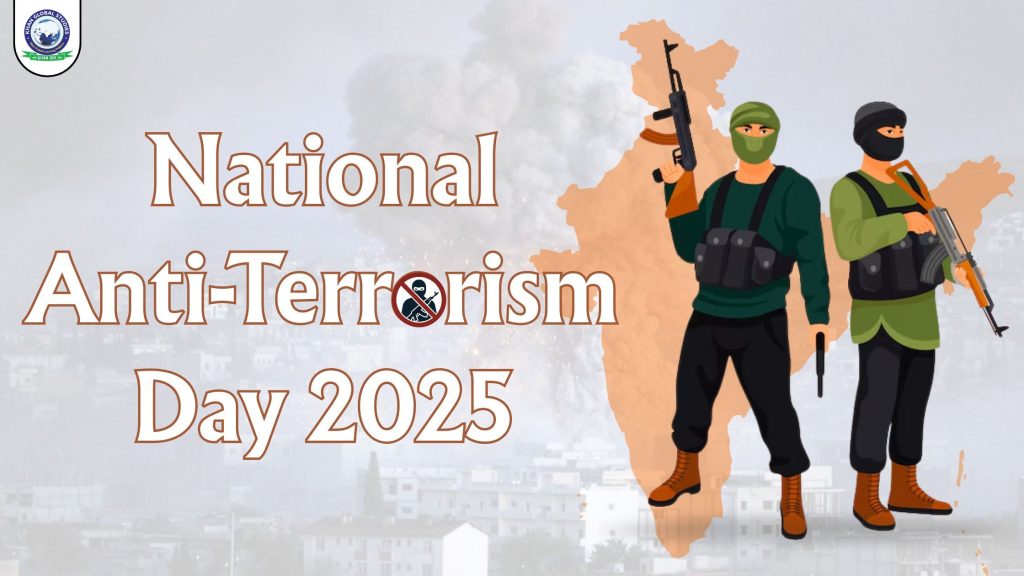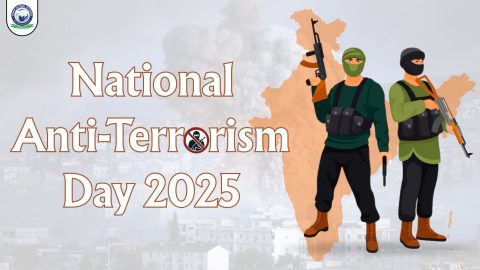In India, National Anti-Terrorism Day is observed every year on 21st May. This day is dedicated to the death anniversary of former Prime Minister Shri Rajiv Gandhi, who was assassinated in a suicide bombing carried out by the Liberation Tigers of Tamil Eelam (LTTE) on 21st May 1991 in Sriperumbudur, Tamil Nadu. Rajiv Gandhi, India’s sixth Prime Minister, assumed office on 31st October 1984 at the age of 40, after the assassination of his mother and then Prime Minister Indira Gandhi, making him the youngest Prime Minister in the country’s history.
National Anti-Terrorism Day was initiated by the V. P. Singh government with the aim of raising awareness about the destructive effects of terrorism and violence, and promoting peace, unity, and harmony. The day not only commemorates Rajiv Gandhi but also serves as a national pledge that India will continue to stand firm against terrorism.
During his tenure (1984–1989), Rajiv Gandhi took several measures against terrorism and extremism. In 1987, he sent the Indian Peace Keeping Force (IPKF) to Sri Lanka to help restore peace, which led to strained relations with the LTTE and eventually became a turning point in his political journey. On this day, educational institutions, government offices, and social organizations across the country organize debates, seminars, and discussions to highlight the dangers of terrorism and unify society against this menace.
Terrorism in Kashmir and Recent Challenges
On 22 April 2025, a brutal terrorist attack on tourists in Pahalgam, Jammu & Kashmir, deeply shook the hopes of peace in the valley. The incident was widely condemned across Kashmir, India, and internationally. As tourism forms the backbone of the region’s economy, the attack not only harmed the area’s livelihood but also severely damaged the global image of the valley. This incident has reignited the debate of “Tourism vs. Terrorism,” where Kashmir’s rich cultural heritage and natural beauty are being threatened by the ongoing menace of terrorism.
Historical Context of Terrorism in Kashmir
Terrorism in Kashmir began around 1989, driven by political instability, electoral malpractice, and public dissatisfaction. Groups like the Jammu & Kashmir Liberation Front (JKLF) started promoting it as a freedom movement. With support from Pakistan’s intelligence agency ISI, local youth were radicalized and recruited into anti-India activities. Corruption and administrative failures allowed such movements to gain public sympathy.
Religious extremism was linked with political struggle. Separatist leaders used slogans of “Islamic Jihad” to gain support from international Islamic organizations. Extremist ideologies were spread through mosques, madrasas, and media. High unemployment, lack of education, and political uncertainty pushed youth towards radicalization. Militant groups glorified martyrdom and inspired youth toward violence. Post-2010, local militancy grew stronger.
Pakistan continues to wage a “proxy war” in Jammu & Kashmir. Terror groups like Lashkar-e-Taiba, Jaish-e-Mohammed, and Hizbul Mujahideen have spread terror in India with cross-border support. Weapon and drug supply through drones and border infiltration have become frequent. A new threat in the form of “Hybrid Terrorism” is also emerging, where ordinary citizens are being used for terrorist acts.
Efforts for Peace and Challenges
- Key Initiatives:
- Abrogation of Article 370 (2019) and the reorganization of Jammu & Kashmir into two Union Territories led to administrative reforms and development.
- Over ₹70,000 crore in economic investments, along with new roads, tunnels, railway connectivity, and airport expansions have strengthened infrastructure.
- In 2023, Srinagar successfully hosted the G20 Tourism Working Group meeting, improving Kashmir’s global image.
- Elections for assemblies, panchayats, and district councils strengthened grassroots democracy.
- Youth engagement through skill development, sports, and cultural programs has increased.
- New home-stay schemes, film shooting guidelines, and cultural festivals have boosted tourism revival.
- Emphasis on technology-based surveillance, minimal damage security policies, and community dialogue for safety and trust-building.
- Challenges:
- Ideological radicalization and militant propaganda on social media.
- Cross-border terrorism and drone-based arms supply.
- Political instability and leadership conflicts.
- Social mistrust and prevailing fear.
- Unemployment and economic disparity.
Economic and Tourism Significance of Kashmir
Tourism is a major pillar of Kashmir’s economy. Local businesses, hotels, taxi services, and the handicrafts industry benefit from tourism. Activities like skiing, trekking, and Shikara rides provide key employment. Tourism also helps promote local culture and offers the youth alternative livelihood opportunities.
Impact of Terrorist Activities
- Fear and mistrust among tourists, negatively impacting tourism.
- Local businesses and jobs are endangered; investments halt.
- Children and youth suffer from mental stress, impacting education.
- Strong security operations sometimes create resentment among locals.
- Negative media coverage leads to Kashmir being perceived globally as a conflict zone.
- Increased political instability and security concerns.
The Way Forward
- Use of modern security technologies like drone surveillance, AI-based monitoring, and empowering local police.
- International pressure on Pakistan to curb financial and military support to terrorism.
- Strengthen local administration to build public trust.
- Increase access to education, skill development, and job opportunities for youth.
- Ensure strict security and launch a “Safe Kashmir” campaign to regain tourist trust.
- Promote dialogue, peace-building campaigns, and social awareness.
- Counter radicalization through education in tolerance and human rights.
Conclusion
National Anti-Terrorism Day reminds us that the fight against terrorism must continue. At the same time, there is a need for coordinated efforts to restore peace, development, and harmony in Jammu & Kashmir so that the valley can once again emerge as a safe, prosperous, and vibrant tourist destination. India will always stand firm against terrorism and ensure the safety of its citizens.





